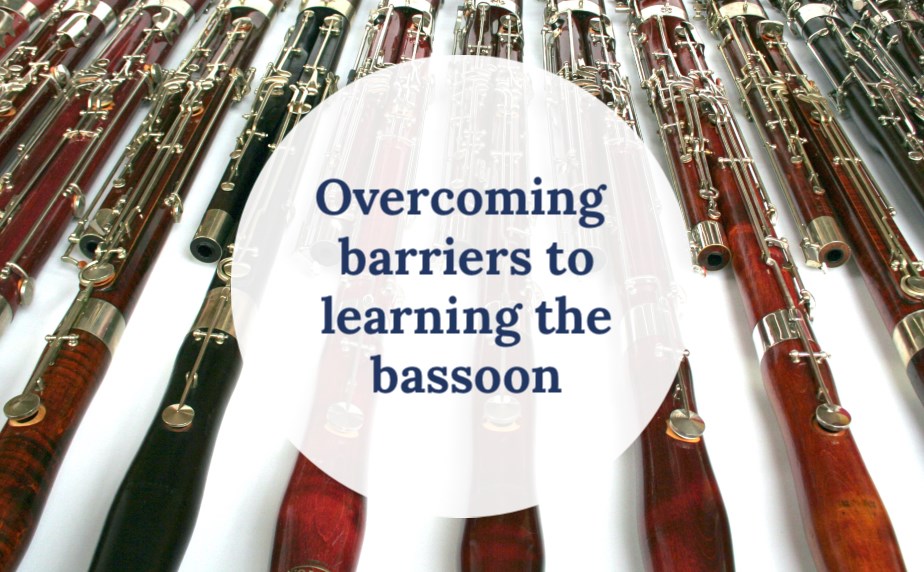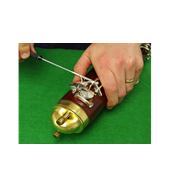Overcoming barriers to learning the bassoon
July 5th, 2024

Overcoming barriers to learning the bassoon
Taking up a new instrument takes courage, particularly if it is your first instrument. It is all too easy to be put off by the perceived barriers, or to throw up mental ones that can prevent you getting started – I’m too old, too young, too unfit, not ‘musical’, and so on. Read on to find out if these barriers really apply to you or not.
Does the bassoon have age limits?
While there are no age limits as such, if you are aged between seven and ninety you are an Ideal candidate for the bassoon.
At the lower end of the age range the determining factor is the size of the person and of their hands. 10 or 11 years old is normally seen as the age to start either on a short reach or full sized bassoon. Younger than that and we would recommend a mini bassoon, from around the age of seven. Mini bassoons provide an ideal starting point for young bassoonists because much of the technique is directly transferable to a full sized instrument.
At the top end of the age range there really is no limit. We have had people taking up the bassoon in their sixties, seventies and eighties.
So, if you are between the ages of seven and ninety, read on to find out more about learning to play the bassoon.
Am I ‘musical’?
Let’s just be emphatic about this - there is no such thing as being ‘musical’. Non-players think you must have some inherent elusive ability to play an instrument, when players know that most of it is just effort. Of course, some people take to it more easily than others, but why does it matter if you take a bit longer, as long as you are making steady progress?
Nearly every one of us can become a competent bassoonist with effort. If we don’t pick it up quite as quickly as the next person, a bit more effort will close the gap soon enough.
What if I don’t know much about music?
Plenty of children and adults start on the bassoon knowing absolutely nothing about music or notation. If you are in this position then don’t worry, you will learn what you need to know as you start playing.
However, if you have already played another instrument which strays into the bass clef you have a head start. And if you have already played another woodwind instrument, especially the oboe, you will have a further head start.
What kind of teacher will I need?
As a beginner you won’t necessarily need to be taught by a professional bassoonist. More important is that the teacher has an empathy for learners and an understanding of the problems beginners face.
If you are starting as an adult, it is best to look for a teacher who has good experience of teaching adults, as it requires a different skillset and outlook compared with teaching children. Adults often need more flexibility and freedom around lesson times/frequency to fit in with work commitments, which teachers of children only aren’t always set up to provide.
If you don’t know any bassoon teachers in your area, start by asking around among people you know who may play another orchestral instrument or know someone who does. Then ask your local children’s music service. Failing that, try asking us or go online and try to source one.
Do I need to do grades?
For children the answer is likely to be yes. If you are an adult, then it depends. You need to decide what your goals are and whether going in for exams gives you the structure you need on the one hand, or on the other whether exams will restrict the repertoire you wish to play or in some other way hamper the achievement of your goals.
What about music theory?
Music theory is an important part of learning to play any instrument, so you ideally need to grasp the fundamentals at least.
If you do grades, there is normally an examined music theory component, as well as practical exams, so you should be taught music theory by your teacher as you go along. If you don’t do exams you won’t automatically pick up the theory, so you will need to learn separately the aspects of it relevant for the sort of playing you are doing as a minimum.
Where will I get a good quality bassoon that I can afford?
It is possible to rent bassoons, but the cost adds up before long, and bassoons available for rent are often indifferent at best. So buying is the preferred option if you are settled in your own mind that playing the bassoon is something you are going to tackle.
Second hand bassoons are a good option (which is why we sell just second hand) as they are cheaper and hold their value better. However, ensure that it has been properly set up so that it plays as it did when it left the factory. And also ensure that it has been serviced recently to a high standard by a reputable company, to avoid expensive bills for servicing later on.
The last thing you need when starting out is a poorly-playing instrument.
When it comes to the make of bassoon or model, read up about them first and then ask those who understand bassoons best, and have played all the different makes and models under consideration, what they would recommend for your budget.
This is an area where we can really help, as we have experience of playing multiple examples of just about every bassoon ever made in the last 100 plus years.
If you are thinking of taking up the bassoon, we are ready to discuss your options with you and help you find the right instrument in tip top playing condition for your needs.
What about my physical fitness?
For the vast majority of people, fitness won’t be an issue, but here are a few of the criteria you can use to assess your suitability for the bassoon.
Strength – if you are able to carry a small bag of shopping you will be able to carry a bassoon. Bassoons weigh up to 3.5kgs (about 7.5 pounds) and so aren’t heavy at all by themselves. Add a case or gig bag and weight goes up to over 5 or 6kgs. Well below the average bag of shopping. Backstraps on the case help enormously as they spread the load on your shoulders rather than it all falling on one hand and arm.
If you make sure that the tenon corks or string aren’t too tight, taking it apart is not going to be a challenge for an averagely - or even below-averagely - fit person either.
Breath – bassoons make sound by blowing through a narrow aperture in a reed in order to make the air inside the bassoon vibrate sufficiently vigorously to propagate the sound outwards. That needs a bit of pressure and a bit of lung capacity. Not as much pressure as an oboe, and not as much air as a flute, so the bassoon is a happy medium between the two.
If you have major lung problems you may wish to avoid the bassoon, but for the rest of us it should be fine. We have had older oboists moving to the bassoon for this very reason, and they invariably adapt quite easily.
Back and Shoulders – bassoons are quite light for their size, basically being hollow wooden tubes, and we find that very few players have a problem. However, if you have a history of back problems it is worth trying a bassoon out for comfort before buying.
There are quite a few options out there if you need a bit of additional support, from shoulder harnesses to seat straps, spikes and balance hangers. Choosing a less-highly-specified bassoon can also be an option – as the keywork comprises a surprisingly large percentage of the total weight, less keywork and maybe a model with daintier keywork, will result in a lighter instrument compared with a modern professional instrument fitted with all the options.
Fingers – ideally you need 10 intact fingers/thumbs, although we know a successful bassoonist with only 9.5 fingers. Short reach bassoons are specially designed for those with shorter fingers (children or adults) so are worth considering. Adjustable hand rests and products such as MyGrips can also help with reach and are readily available.
Any bassoon can have short reach keys fitted, and further adaptations can be made by a competent bassoon repair specialist to fit more specific needs.
Will I be playing alone?
The bassoon can be played on its own very satisfyingly, but there are immense benefits in playing with others, so as soon as you become reasonably adept at reading music and playing (after, say, a few months) you will probably wish to join an orchestra or other ensemble. You will find that your playing comes on in leaps and bounds.
Look for opportunities in your local orchestra or wind band. Some will accept only higher-level players, but others will accept near-beginners. The great news is that bassoons are in demand as there are relatively few bassoonists around compared with other instrumentalists, so it will be a lot easier to get into an ensemble than if you were playing, say, a flute or clarinet.
Playing in an ensemble has the added bonus of potentially bringing a whole new dimension to your life from a social point of view as well as a playing perspective.
If you have got this far through this article, you are undoubtedly ready to take your first steps to becoming a bassoonist.
If you would like further advice on taking up the bassoon, have any questions, or want to find a good quality bassoon to start your journey, please get in touch – we will be pleased to help and give you advice.
Take a look at all our available second hand bassoons here: Bassoons in stock.
News and guides









